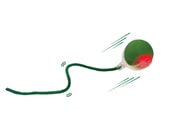A Canadian visiting Australia can’t believe what unusual phrase everyone is saying!
By
- Replies 27
When travelling to new countries, it can be exciting to discover the unique customs and words they use. Even though you’ve only travelled a few thousand kilometres, you can still feel as if you’re in another world – as Canadian Josiah Hein found out when he visited Australia recently.
Josiah Hein was exploring the streets of Sydney when he accidentally bumped into someone and apologised – only for the man to say 'you're right' in response.
'I'm in Australia and I'm walking down the street – and there's this cool guy walking towards me in a suit,' he explained in a video. 'And both of us stop and I apologise – because Canadians apologise 7.8 times a day. He didn't say 'that's all good, bro' or 'that's okay' – the guy said 'you are all right' to me.'
The 'unique' phrase that apparently all Australians use, that no one else uses was so unusual to Josiah – but it’s such a common phrase in Australia that most of us take it for granted and might even forget how unique it really is!
People from different countries don’t always interpret different phrases the same way. Josiah noted that back home, he would expect responses like 'that’s all good, bro' or 'that’s okay', instead of the more matter-of-fact 'you’re right'.
It’s not surprising that this phrase caught Josiah’s attention – it also caught the attention of thousands of Aussies, who were completely taken aback to learn that the rest of the world doesn’t measure two-week periods using 'fortnights', as Aussies do.
Josiah was shocked to see the phrase on an Australian school calendar, saying, 'Here in Australia, look at this – there are 60 minutes in an hour, 24 hours in a day, seven days in a week, 14 days in a fortnight, and 12 months in a year.'
'Fortnight? Has anyone else ever heard of this word? What is this, Harry Potter?' he asked in disbelief.
Josiah was even more surprised when he realised that 'fortnight' was actually a word used by Anglo-Saxons to measure the length of time between a new moon and a full moon, as well as a term that was commonly used in North America and Canada until the 1880s.
Despite Josiah’s confusion, it is quite common for Australians to say 'you’re right'.
Travelling through the diverse landscapes of Australia also comes with a captivating journey through its regional dialects and expressions. As Josiah explored more of Australia, in the city, the bush, and along the coast, he realised that there were more variations and idiosyncratic expressions to learn.
Not only do regions vary in their expressions, but their accents differ significantly too. Adelaide, known for its genteel culture and fine wines, holds a slight British influence in its accents, with a pronunciation more refined and enunciated than in, say, the broad and distinctive twang of Perth.
These nuances in language make it clear that Australia is not just a land of 'you're right' and 'fortnight'. From its bustling cities to its serene countryside, each Australian region has its unique linguistic colour, mirroring its diverse lifestyle and heritage. For travellers like Josiah, this provides an enriching and humorous dimension to their Aussie adventure. As he admitted, 'It’s more than just seeing the sights. Truly understanding and immersing yourself in a place’s culture comes right down to the language you speak - it’s a part of the total Aussie experience I wouldn’t trade for the world.'

From 'you're right' to 'fortnight,' Josiah's vocabulary has certainly expanded during his Aussie adventure. 'I love discovering these quirky cultural differences,' he said. 'It makes travel so enriching.' Though he's headed to New Zealand next, Josiah hopes a little bit of Australia's humour and charm will stay with him forever.
Have you come across any other unusual phrases or customs in your travels? Let us know in the comments below!
Josiah Hein was exploring the streets of Sydney when he accidentally bumped into someone and apologised – only for the man to say 'you're right' in response.
'I'm in Australia and I'm walking down the street – and there's this cool guy walking towards me in a suit,' he explained in a video. 'And both of us stop and I apologise – because Canadians apologise 7.8 times a day. He didn't say 'that's all good, bro' or 'that's okay' – the guy said 'you are all right' to me.'
The 'unique' phrase that apparently all Australians use, that no one else uses was so unusual to Josiah – but it’s such a common phrase in Australia that most of us take it for granted and might even forget how unique it really is!
People from different countries don’t always interpret different phrases the same way. Josiah noted that back home, he would expect responses like 'that’s all good, bro' or 'that’s okay', instead of the more matter-of-fact 'you’re right'.
It’s not surprising that this phrase caught Josiah’s attention – it also caught the attention of thousands of Aussies, who were completely taken aback to learn that the rest of the world doesn’t measure two-week periods using 'fortnights', as Aussies do.
Josiah was shocked to see the phrase on an Australian school calendar, saying, 'Here in Australia, look at this – there are 60 minutes in an hour, 24 hours in a day, seven days in a week, 14 days in a fortnight, and 12 months in a year.'
'Fortnight? Has anyone else ever heard of this word? What is this, Harry Potter?' he asked in disbelief.
Josiah was even more surprised when he realised that 'fortnight' was actually a word used by Anglo-Saxons to measure the length of time between a new moon and a full moon, as well as a term that was commonly used in North America and Canada until the 1880s.
Despite Josiah’s confusion, it is quite common for Australians to say 'you’re right'.
Travelling through the diverse landscapes of Australia also comes with a captivating journey through its regional dialects and expressions. As Josiah explored more of Australia, in the city, the bush, and along the coast, he realised that there were more variations and idiosyncratic expressions to learn.
Not only do regions vary in their expressions, but their accents differ significantly too. Adelaide, known for its genteel culture and fine wines, holds a slight British influence in its accents, with a pronunciation more refined and enunciated than in, say, the broad and distinctive twang of Perth.
These nuances in language make it clear that Australia is not just a land of 'you're right' and 'fortnight'. From its bustling cities to its serene countryside, each Australian region has its unique linguistic colour, mirroring its diverse lifestyle and heritage. For travellers like Josiah, this provides an enriching and humorous dimension to their Aussie adventure. As he admitted, 'It’s more than just seeing the sights. Truly understanding and immersing yourself in a place’s culture comes right down to the language you speak - it’s a part of the total Aussie experience I wouldn’t trade for the world.'
Key Takeaways
- Josiah Hein, from Canada, is enamoured by the unique Australian phrase 'you're right,' commonly used instead of 'you're okay' or 'you're good.'
- Hein was surprised by the casual and laid-back usage of the term. He believes it encapsulates the Aussie swag and greatly differs from response phrases in Canada or America.
- He was also stunned to find the word 'fortnight' used in Australian calendars, a term he associated only with Harry Potter.
- Many Australians online were surprised that the rest of the world did not use 'fortnight' to denote two weeks, an Australian practice derived from the Anglo-Saxons using fortnights to measure the length of time between a new moon and a full moon.
From 'you're right' to 'fortnight,' Josiah's vocabulary has certainly expanded during his Aussie adventure. 'I love discovering these quirky cultural differences,' he said. 'It makes travel so enriching.' Though he's headed to New Zealand next, Josiah hopes a little bit of Australia's humour and charm will stay with him forever.
Have you come across any other unusual phrases or customs in your travels? Let us know in the comments below!








